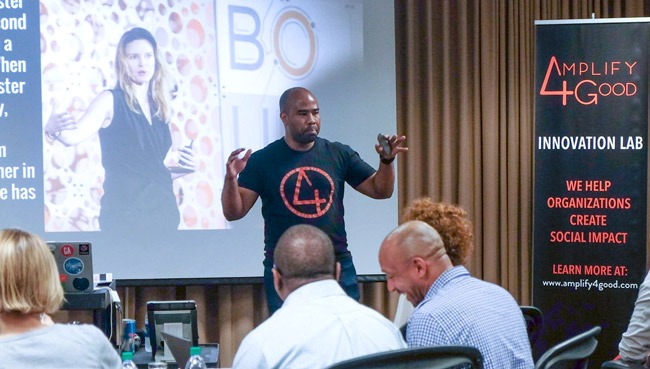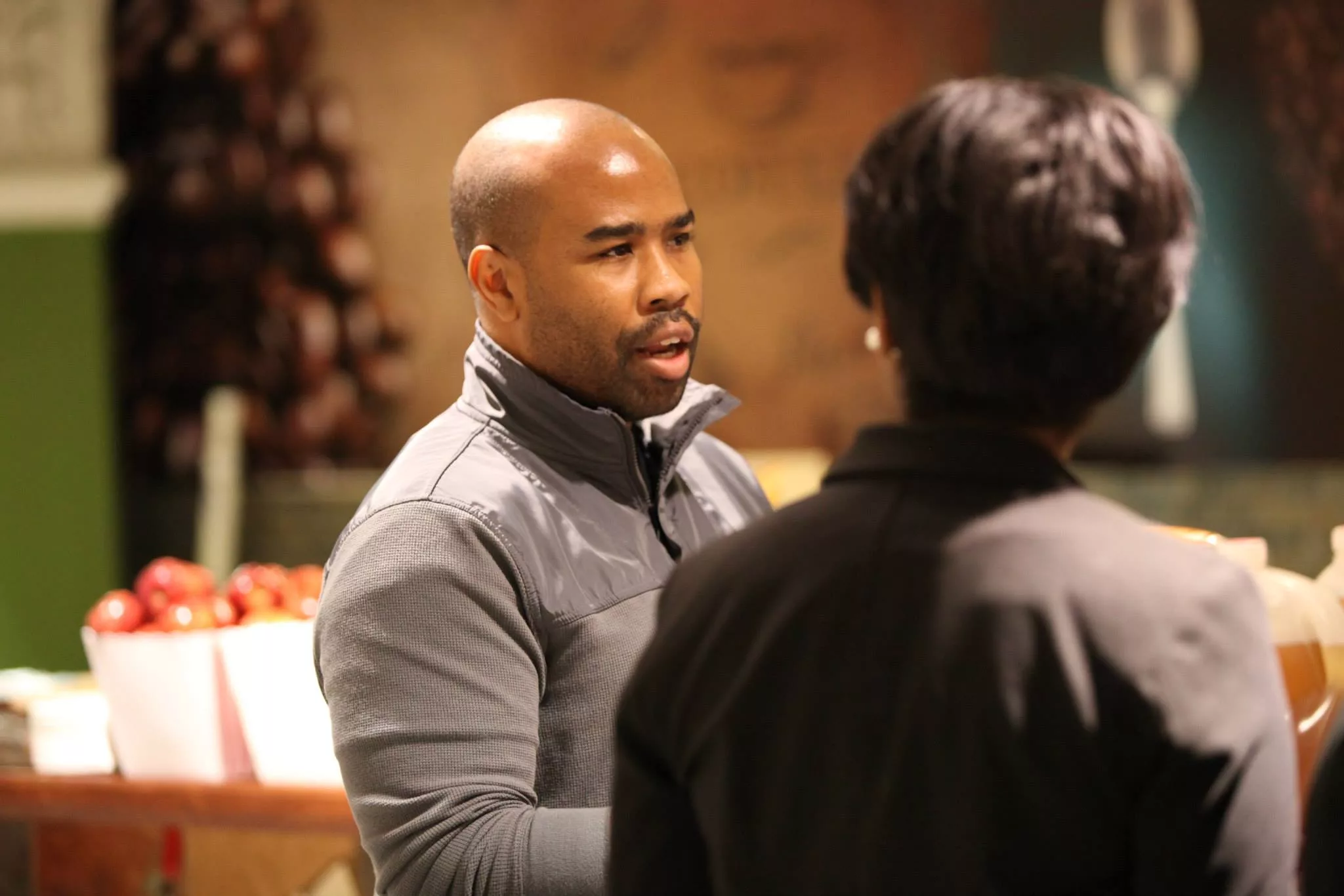Joey Womack is the cofounder and CEO of Amplify 4 Good, a social enterprise that uses hackathons and rapid problem-solving to help underrepresented employees from all backgrounds speak up, be heard, and create positive change within their organizations. Since it was founded in 2014, Amplify 4 Good has worked with organizations such as CARE USA, Google, NetHope, Hartsfield-Jackson Atlanta International Airport, Ford Motor Company, Coca-Cola, United Negro College Fund, and the National Black MBA Association. He is also the Co-Founder and Executive Director of Goodie Nation, a nonprofit social impact organization that uses an innovative process drawn from the tech industry to solve some of society’s toughest problems.
Among his many accolades, Womack has been named one of 20 Innovators Shaping Atlanta’s Black Startup Community in Huffington Post and was recognized as an Equity Champion at the 2018 Atlanta Startup Awards.

You’ve been named one of Atlanta’s best known and most successful social impact entrepreneurs. Can you describe the local impact ecosystem and the role you play in it?
Joey Womack: Atlanta has been known as “the city too busy to hate” going back to the days of MLK. It has had a robust impact ecosystem of nonprofits and foundations. Atlanta also currently has an ecosystem initiative in place to become the global public health capital of the world. Where I sit is in the sector working on innovation in social impact, specifically around technology and early stage ventures.
There are many key parts of Atlanta’s impact ecosystem and a lot of very interesting things going on here, but it is very siloed. We also have a lot of people doing great social impact work locally, but only a few burgeoning groups of individuals trying to do things on a national or global scale.
We are starting to see talent moving in from other parts of the country and world. That is raising the bar. We are not as efficient in terms of how we are connecting with each other as we should be. I’ll give you a quick example. One of Atlanta’s social entrepreneurs who has received national attention recently is Jasmine Crowe of Goodr. Goodr is a tech solution that connects potentially wasted food to nonprofit shelters, church food-banks, and other organizations that distribute food to the hungry.
Back in 2016 when she had the original idea for Goodr, Jasmine was already a successful entrepreneur with her own small business. But when she tried to get early support for Goodr, people told her that her idea would never work. She then found out about Goodie Nation’s pre-accelerator program, but saw the application period would be closing in one hour. Jasmine immediately sent me an email with her idea. I just happened to read it right away and told her that her idea was good. She was accepted to our program and the rest is history.
I bring that story up because, had I not seen her email, Jasmine may not have gotten the opportunity or support to develop that idea into the successful venture it became. I think there are many more Jasmines in Metro Atlanta right now. The talent is here, but too many are not getting the opportunities that they deserve. At the end of the day, we’ve got to do a better job of finding those individuals and giving them the resources they need to grow into their potential.
Atlanta has been called one of the top cities in America for Black entrepreneurs, with one of the highest numbers of Black-owned businesses in any city in the nation. In your view, what is Atlanta doing right? What lessons could other cities learn from Atlanta to support the growth of businesses owned by entrepreneurs of color?
JW: One of the key assets in Atlanta is the number of colleges and universities. Atlanta has more colleges and universities than anywhere in the south, including many historically Black colleges and universities. A few of those centers of excellence and innovation form the Atlanta University Center including Spelman College, Morehouse College, and Clark Atlanta. Also, Georgia State University is graduating more African American students than any other nonprofit college or university in the country, even though it is not a historically Black school.
Atlanta has also done a good job of retaining Black talent throughout the years. It has a strong Black professional class and is attracting more and more people every year. I think efforts to retain Black talent can be a way for all cities to raise the bar. And that spills over into entrepreneurship in general which will impact the social impact scene as well.
The big three main areas of focus for this SPECTRUM event are access, inclusion, impact. What do you think can be done to increase increase access, inclusion, and impact for entrepreneurs of color locally in Atlanta and nationally?
JW: I often use the analogy of a skyscraper to talk about this. You’ve got very few people in the penthouse, more on the middle floors, and a bunch of people on the first and second floors. Many of the people on the first and second floors are extremely talented and want to climb, but there is no elevator to get to the top or even to the middle floors. There is a staircase, but it is so narrow there is only room for one at a time to climb. We need to invest in structural changes that will help more people get to the top as well as in mentorship from those who are already on the top floors.
Several programs have popped up over the last few years in Atlanta to support entrepreneurs of color and help accelerate ventures that offer solutions to inequality. However, some programs I believe are pushing changemakers of color to go into an environment where it is very difficult for them to thrive. For example, some entrepreneur support organizations (ESOs) put out the message that it’s venture capital or bust. So if ESOs are trying to push everyone towards that one certain type of investment it will be impossible for many of those changemakers to secure funding. Potential is being wasted. Alternative sources of capital are needed and we must bring more diverse types of people to the table to make investment decisions.
The purpose of the SPECTRUM event is to stimulate solution-driven conversations about how to close the racial wealth gap and create systems for identifying, fostering, and supporting entrepreneurs and business leaders of color. What impact would you like to see this gathering have in the months and years following the event?
JW: I think SPECTRUM is coming at a great time. There is an existing initiative called the Georgia Social Impact Collaborative (GSIC) that was spurred by some influential people who attended SOCAP and said, ok we should bring together the ecosystem here. I joined their Advisory Board in 2017. Their efforts galvanized all the entrepreneur support organizations and investors in the state of Georgia, not just in metro Atlanta. They’ve done some great work already, but have a long way to go. One of the things I would like to see immediately grow out of SPECTRUM is a renewed interest in creating and producing programming for the best talent from underrepresented communities to ensure that they have equal opportunity to receive funding. I think that can happen and that SPECTRUM can serve as a springboard to make that happen.
Another thing I’d like to see is for SPECTRUM to draw wider attention to some of the talent we have in Atlanta. I’ve seen some of my peers, people who have a national and global scale talent, who have not gotten the attention that they deserve, and I would love to see SPECTRUM serve as a type of platform for the very talented people in the city to get the attention that they deserve nationally to help them reach their full potential.
Who needs to be in the room participating in this conversation to spur and scale solutions that will help create an equitable economy that supports all entrepreneurs?
JW: I believe the individuals who truly need to be in the room are those that lead existing entrepreneurial support organizations. I would particularly like to see entrepreneurs who have achieved success and are now pouring money back into the overall entrepreneurial ecosystem in Atlanta. Many of them do pay attention to the diversity and inclusion conversations that are already happening, but not necessarily through the lens of social impact. I’d like to see these individuals and organizations come to the table because they have the resources and connections to make change at the flip of a light switch.
What are you most excited to be bringing to the conversation at SPECTRUM?
JW: I am excited about bringing a challenge to the people. When I am training entrepreneurs I say that innovation comes in times of discomfort. That’s how I got to what I am doing right now–I was challenged to come up with my goal of helping a billion people by the year 2039.
I’m looking forward to making people a little uncomfortable. Not necessarily by the content of the conversation per se, but by saying–hey we have the ability to do much more in the city. Not only for people within the metro Atlanta area, but globally. We can make that impact. I want to ask people, are you going to step up to the plate and explore the limits of your potential? Or are you going to sit back and remain comfortable by doing what you are currently doing?
I’m definitely looking forward to seeing a bunch of amazing people in a room for two days. And I’m really looking forward to seeing what is going to come out of the Civic Dinners that are planned for the end of day one. Civic Dinners was in my program and I know the Founder, I’ve hosted a dinner, I’ve been to a few. I know the power that can come from those small conversations over dinner. And I know if we get the right people in the room at SPECTRUM and around the table at a Civic Dinner and give them a call to action, some amazing things are going to grow out of that. We can start to see some real momentum.
What is inspiring you in your work right now?
JW: I love seeing entrepreneurs come in wide-eyed with all this passion for the change they want to see. I love seeing an idea rattling around in someone’s head become something tangible–something they can actually see impact beneficiaries. That is what drives me. I don’t want to let those founders down and I don’t want to let their beneficiaries down either.
What call to action would you issue to anyone who wants to help build a fair, just, and more equitable economy?
JW: Sign up for SPECTRUM. Tell your friends. Invest in the conversations about access, inclusion, and impact that are going on year round at SOCAP and elsewhere. Invest in yourself and invest in the world and we’ll make it a better place.
Join Joey Womack in the conversation about access, inclusion, and impact at SPECTRUM in Atlanta June 12 – 13, 2019. Learn more and register for SPECTRUM here.
Womack was featured in the Black YourStory video series on YouTube:




